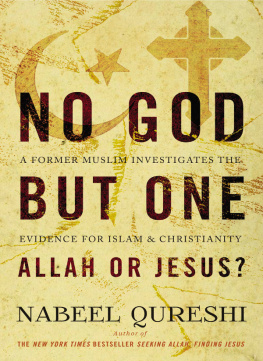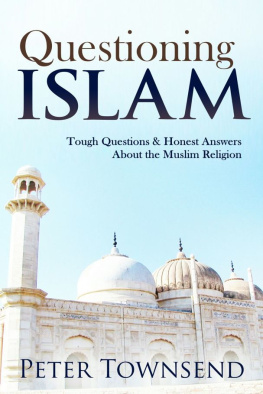ISLAM
DISMANTLED
The Mental Illness of
Prophet Muhammad
By
Sujit Das
With a Preface by Ali Sina
In the interests of keeping cost as low as possible for the readers and to raise public awareness of the true nature of Muhammads prophethood and support, the Author decided to sell this book on a non-profit basis.
Publisher: Felibri.com
felibri@gmail.com
Publication date: January 2012
Distributed by Ingram Book Group
Islam Dismantled / by Sujit Das.
Includes index.
ISBN 978-1-926800-06-6
1. Muhammad, Prophet, d. 632--Psychology.
2. IslamControversial literature. I. Title.
Copyright Sujit Das
All rights reserved. No part of this publication may be reproduced, stored in a retrieval system, or transmitted in any form or by any means, electronic, mechanical, photocopying, recording, or otherwise, without the prior permission of the Author.
PRINTED IN THE UNITED STATES OF AMERICA
*****
Picture on the cover : The flight of Muhammad and Abu Bakr to Medina. Color lithograph by A.C. Michael. (Original in a private collection)
*****
Dedicated to the victims of Islamic jihad worldwide
Your sufferings are not forgotten
*****
One of the most interesting and harmful delusions to which men and nations can be subjected is that of imagining themselves special instruments of the Divine will.
Bertrand Russell
There are no misunderstandings in nature; they are only to be found in the realms that man calls understanding.
Carl Jung
Chapter 1: The Flashback of a False Prophet
1.1: Muhammads Strange Prophetic Claim
The religion of Islam was developed from the prophetic claim, preaching and life of Muhammad early in the seventh century of the Christian era. During that time, the old Arabian paganism was in a process of slow disintegration, and Judaism and Christianity were widely gaining popularity. Several self-proclaimed Prophets had arisen with various degrees of success in convincing people. In the beginning Muhammad was such a self-proclaimed Prophet, but with time he successfully synchronized certain basic elements of Judaism and Christianity with the pagan practices and added some nationalistic Arab pride and it has become a world religion today.
From the authentic Islamic sources it appears that Muhammad thought of himself as in the succession of the Old Testament men of faith who was sent on a divine mission by the one and only God, Allah. Throughout the Quran he pretended that his mission is the sequel of the previous Semitic Prophets. Like Noah, Jonah, and Elijah, he preached a religious message in the name of this Supreme Lord; like Moses he issued legislation in His name; and like Abraham, he was not only a maintainer of righteousness but also the founder of a community of the righteous. But unlike Christianity, his religious endeavor was an utter failure unless he was able to draw the sword and use it successfully to impose his religion on others.
Muhammad declared himself a Prophet of Allah when he was about forty years old. Bukharis Hadith (1.1.3) recorded Muhammads first experience with the angel Gabriel that was less heavenly and more demonic. Once in the cave of Hira the angel Gabriel came to him with some written messages from Allah and asked him to read. Muhammad replied, I do not know how to read . Three times Muhammad expressed his inability to read, but Gabriel forcefully gave him the message of Allah the famous first revelations of the Quran of the Surah ninety-six.
In the name of thy Lord Who created (Q: 96.1),
Created man from a clot (Q: 96.2).
Read: And thy Lord is the Most Bounteous (Q: 96.3)
Who taught (to write) with the pen (Q: 96.4)
Taught man that which he knew not (Q: 96.5)
The fact that Allahs messages started descending upon Muhammad in a violent way is entirely sufficient for a rational person to have doubt on the truthfulness of the Quranic revelations. Surprisingly, Muhammad himself was the first person to doubt the genuineness of the revelations. Bewildered and terrorized, he hurried back to his wife; Whats wrong with me? he asks his wife. Just as kids hide under the covers when they are afraid of monsters in the dark, Muhammad told his wife to wrap him in a blanket. He did not want to see the cause of terror again, and thought that he was either going mad or possessed by an evil spirit.
After this first revelation, Allah was silent for about three years. Muhammad was so sad that he wanted to commit suicide. Several times he intended to throw himself from the top of high mountains but every time he went up the top in order to throw himself down, Gabriel would appear before him and said, O Muhammad! You are indeed Allahs Apostle in truth . This is how Muhammad began to believe that he was a messenger of God a messenger of such a demonic God whose influence caused him to attempt suicide.
How many Muslims are aware of Muhammads suicide attempts? Few Islamic leaders will teach this to their fellow Muslims because it casts a stain upon Muhammad; it brings doubt to his trustworthiness and the credibility of his assumed heavenly experience. Some Muslims deny the sources of the story while others, knowledgeable about the sources, respond by saying that the shock of the experience caused him to attempt suicide.
Allah confirms in the Quran (33.40) that Muhammad was the seal of the Prophets. According to Islamic sources (Muslim: 30.5790; Sunnan Abu Dawud: 32.4071; Bukhari: 1.4.189), Muhammad had a big mole as big as a pigeons egg on his back between the shoulders which he claimed as the proof of his prophethood. There is no religious scripture which confirms that a mole between the shoulders is a sign of prophethood. What he showed as a proof of Allahs seal was a physical defect which anyone can have. There is no divinity in this. It is simply beyond the capacity of a logical thinker how this is supposed to be one of the proofs that convince people of Muhammads prophethood!
Muhammad gave no concrete proof of his heavenly appointment. Did he lie shamelessly to fool the Arab pagans? Was he under delusion? The validity of Islam depends absolutely on the reliability of Muhammad. If there is no solid reason to conclude that Muhammad was the true messenger of God, we may reasonably suppose that Islam is false. If we can prove that Muhammad was untrustworthy, Islam self-destructs. The scholars, who are most familiar with Arabic sources and have clear understanding of the life and time of Muhammad, e.g., Margoliouth, Hurgronje, Lammens, Arthur Jeffery, Clair-Tisdall, Andrew Rippin, Ibn Warraq and Caetani, are the most decisive against Muhammads prophetic claim. The more we read their valuable research works, the more we find it difficult to disagree with them. Muhammad declared that lying is acceptable if it is used to propagate the cause of Islam. This particular statement should make us wonder how often Muhammad took advantage of this principle while claiming his title of a Prophet and preaching his message.
If we take Quran as the primary foundation of Muhammads prophethood, the doubt is still not dispelled at all. We need to ascertain how firm ground does it provide. There are serious doubts about the trustworthiness of Quran also. Like Muhammads prophetic claim, Quran itself is self-declarative there is no external proof. This book describes itself by various generic terms, comments, explains, distinguishes, puts itself in contrast with other religious books and claims to be holy. The Quranic claims are great, but what is miserable is that, this supposed to be holy book fails to prove either Muhammads prophethood or its divine origin. Ultimately, it becomes a circular reasoning. Quran is Gods word because Muhammad said so, and Muhammad was Gods Prophet because Quran says so. But circular reasoning is a logical fallacy. We are not happy with this.










